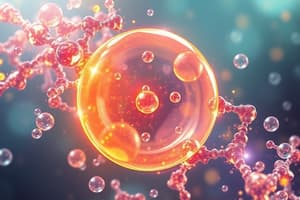Podcast
Questions and Answers
PUFAs are recommended for the treatment of residual symptoms of schizophrenia.
PUFAs are recommended for the treatment of residual symptoms of schizophrenia.
False (B)
The suggested dose of EPA for patients at high risk of first-episode psychosis is 700mg/day.
The suggested dose of EPA for patients at high risk of first-episode psychosis is 700mg/day.
True (A)
Careful assessment of response is necessary when using fish oils for schizophrenia, and they should be withdrawn if no effect is seen after 4 months.
Careful assessment of response is necessary when using fish oils for schizophrenia, and they should be withdrawn if no effect is seen after 4 months.
False (B)
A dosage of 2g/day of EPA is recommended for the residual symptoms of multi-episode schizophrenia when added to antipsychotic treatment.
A dosage of 2g/day of EPA is recommended for the residual symptoms of multi-episode schizophrenia when added to antipsychotic treatment.
Both PUFAs and other metabolic effects are considered beneficial for prevention of transition to psychosis in young people.
Both PUFAs and other metabolic effects are considered beneficial for prevention of transition to psychosis in young people.
Fish oils contain omega-6 fatty acids, eicosapentaenoic acid (EPA) and docosahexaenoic acid (DHA).
Fish oils contain omega-6 fatty acids, eicosapentaenoic acid (EPA) and docosahexaenoic acid (DHA).
A meta-analysis found that EPA had a statistically significant beneficial effect in established schizophrenia.
A meta-analysis found that EPA had a statistically significant beneficial effect in established schizophrenia.
A study showed that 700mg of EPA and 480mg of DHA in adolescents at high risk of psychosis resulted in a reduction of psychotic symptoms.
A study showed that 700mg of EPA and 480mg of DHA in adolescents at high risk of psychosis resulted in a reduction of psychotic symptoms.
The NEURAPRO trial provided evidence that 840mg of EPA and 560mg of DHA effectively prevents transition to psychosis in high-risk patients.
The NEURAPRO trial provided evidence that 840mg of EPA and 560mg of DHA effectively prevents transition to psychosis in high-risk patients.
Limitations in the published studies include small sample sizes and heterogeneity of diagnosis.
Limitations in the published studies include small sample sizes and heterogeneity of diagnosis.
Fish oils are known to cause severe gastrointestinal distress in patients taking them.
Fish oils are known to cause severe gastrointestinal distress in patients taking them.
Cochrane concluded that omega-3 fatty acids provide strong evidence for preventing transition to psychosis.
Cochrane concluded that omega-3 fatty acids provide strong evidence for preventing transition to psychosis.
Adding 2-3g of EPA daily is believed to be a worthwhile option in treating schizophrenia alongside standard treatments.
Adding 2-3g of EPA daily is believed to be a worthwhile option in treating schizophrenia alongside standard treatments.
Flashcards are hidden until you start studying
Study Notes
Omega-3 Fatty Acid (Fish Oils) in Schizophrenia
- Omega-3 fatty acids, specifically eicosapentaenoic acid (EPA) and docosahexaenoic acid (DHA), are found in fish oils.
- They’re important for neuronal membrane structure, modulating membrane proteins, and producing prostaglandins and leukotrienes.
- Evidence suggests a protective effect of high dietary PUFAs against psychosis.
- Antipsychotic treatment seems to normalize PUFA deficits.
Treatment Recommendations
- Not recommended for residual symptoms of multi-episode schizophrenia (added to antipsychotic).
- If used, suggest a dose of EPA 2g/day.
- Not recommended for patients at high risk of first-episode psychosis.
- If used, suggest EPA 700mg/day.
Treatment Effectiveness
- A meta-analysis found no significant beneficial effect of EPA in established schizophrenia.
- A trial showed a reduction in symptom severity in first-episode schizophrenia patients given 2.2g EPA + DHA daily for 6 months.
- However, other trials with 2g daily EPA in acute psychosis and relapse prevention showed no benefit over placebo.
- Limitations in published data, including small sample sizes, heterogeneity of diagnosis, and differences in interventions, contribute to inconclusive findings.
- Overall, evidence suggests EPA (2-3g daily) is unlikely to be a worthwhile option in schizophrenia when added to standard treatment.
Prevention
- A study of 700mg EPA + 480mg DHA in high-risk adolescents and young adults showed a reduction in psychotic symptom emergence.
- However, this study's evidence was considered "very low quality" in a review.
- The NEURAPRO trial, giving 840mg EPA + 560mg DHA for 6 months, found no evidence of efficacy in reducing transition to psychosis or improving symptoms.
- Cochrane concluded that omega-3 fatty acids may prevent transition to psychosis in the prodromal phase, but the evidence is low quality.
- Overall, the effectiveness of omega-3 fatty acids in preventing transition to psychosis requires further investigation.
Studying That Suits You
Use AI to generate personalized quizzes and flashcards to suit your learning preferences.




